
Overview
The article provides an in-depth overview of the current job market for development managers, emphasising the ten most sought-after job openings available today. It highlights the escalating demand for development managers across diverse sectors, outlining the critical skills and qualifications necessary for these positions. Furthermore, it underscores the significance of networking and the impact of tailored applications in successfully securing a role in this competitive landscape.
Introduction
In the ever-evolving landscape of project management, the role of a development manager has emerged as a cornerstone for organisational success. As companies navigate the complexities of executing high-stakes projects, development managers are called upon to:
- Coordinate diverse teams
- Manage budgets
- Ensure that projects meet stringent quality standards
Furthermore, with the demand for skilled professionals in this field on the rise, understanding the essential skills, qualifications, and industry trends is crucial for aspiring development managers. This article delves into:
- The multifaceted responsibilities of development managers
- The sectors actively seeking their expertise
- The strategic approaches that can propel their careers forward in a competitive job market
Understanding the Role of a Development Manager
Development manager jobs play a crucial role in the effective planning, execution, and delivery of initiatives within organisations. This multifaceted role requires the coordination of diverse stakeholders, meticulous budget oversight, and a steadfast dedication to ensuring compliance with quality standards and timelines. Development leaders must demonstrate strong leadership abilities, guiding diverse teams and promoting effective communication across departments.
In 2025, the demand for development manager jobs continues to rise, reflecting their essential role in managing the complexities of project execution. Current statistics indicate that organisations that prioritise growth management are 92% more likely to innovate and introduce new products to the market, highlighting the strategic significance of this role.
Leadership abilities are vital for growth leaders, enabling them to motivate their teams and foster a cooperative atmosphere. Expert viewpoints emphasise that proficient leaders not only drive initiative success but also enhance overall organisational resilience
‘Naismiths’ comprehensive property enhancement platform significantly aids supervisors by providing precise cost information, real-time monitoring solutions, and robust performance evaluation tools. The platform’s ability to assess technical risks and compare expenses with historical data empowers leaders to make informed decisions, ultimately improving delivery. The responsibilities of a Development Manager, extend beyond simple oversight; they encompass strategic planning and problem-solving to address challenges that may arise during execution.
Case studies illustrate that effective project leaders leverage their leadership skills alongside Naismiths’ tools to enhance team performance and project execution, ultimately contributing to the organisation’s success in a competitive landscape. Additionally, remote leadership statistics reveal that remote supervisors encounter unique challenges, including higher retention issues and difficulties in team collaboration compared to onsite supervisors, emphasising the necessity for effective communication strategies. As the role evolves, staying abreast of current trends and best practices in project management will be essential for aspiring professionals in this dynamic field.
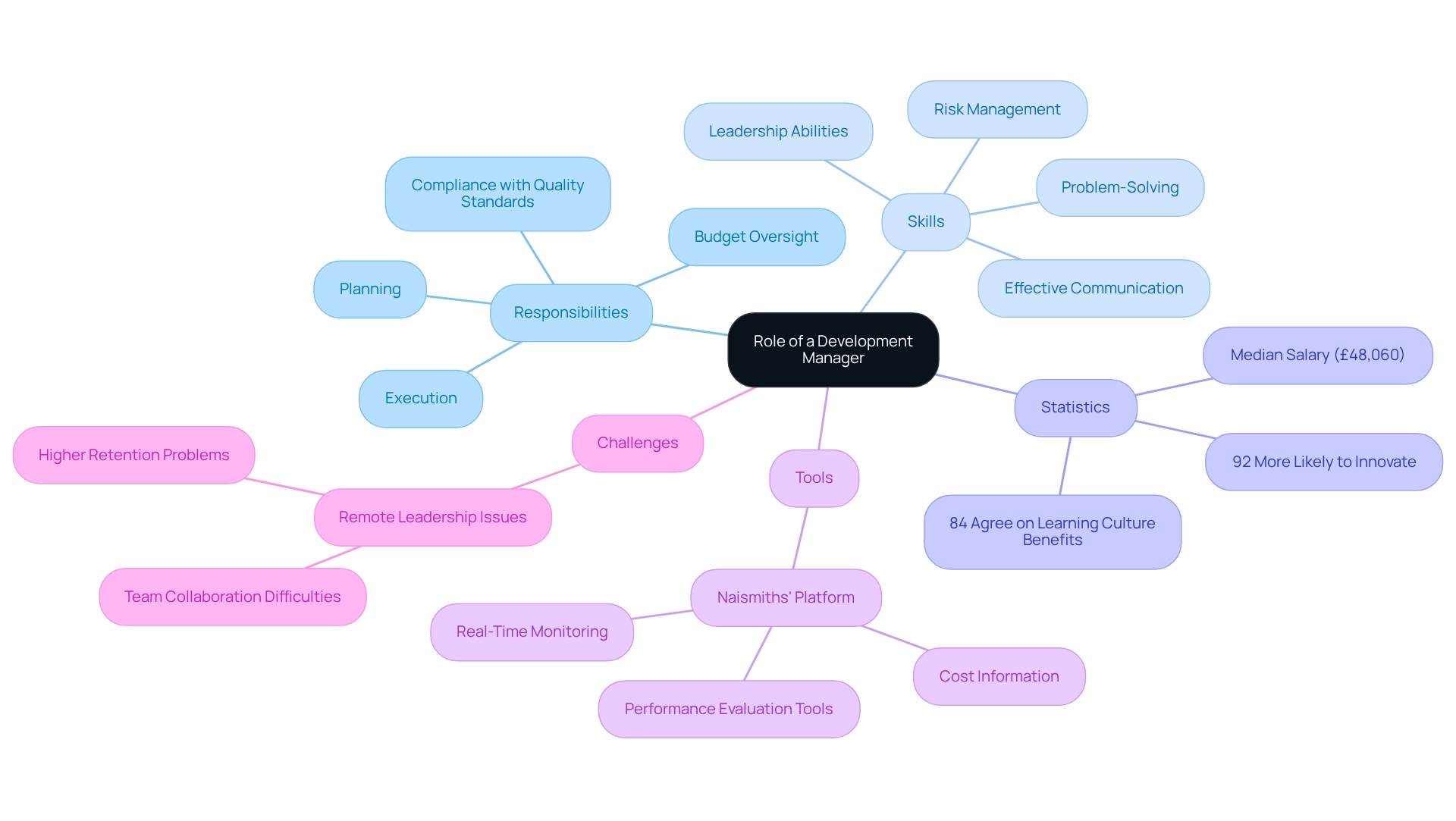
Sectors Hiring Development Managers
Development manager jobs are increasingly sought after across diverse sectors, including construction, technology, healthcare, and finance. In the construction sector, companies like Naismiths are actively seeking supervisors to oversee monitoring tasks, ensuring adherence to regulations and upholding high-quality standards. This demand is underscored by the overall growth in the construction sector, which has seen significant activity. Such strategic growth opportunities emphasise the essential requirement for skilled leaders who can facilitate operational improvements and navigate intricate initiatives effectively.
In the technology field, development manager jobs play an essential role in guiding software creation efforts, fostering innovation, and coordinating cross-functional teams to provide state-of-the-art solutions. The healthcare sector also offers substantial prospects, as organisations seek development manager jobs to oversee facility expansions and improve service delivery, especially in response to changing patient needs and regulatory requirements. Successful hiring practices in healthcare emphasise the importance of candidates who can demonstrate both technical expertise and a strong understanding of regulatory frameworks. Understanding the specific demands of these sectors can empower candidates to tailor their applications effectively.
Essential Skills and Qualifications for Development Managers
To thrive as a programme manager, candidates typically require a bachelor’s degree in business administration, task coordination, or a related field. Essential skills include strong leadership, excellent communication, strategic planning, and financial acumen. In today’s fast-paced environment, familiarity with project management tools and techniques, is increasingly advantageous.
Looking ahead to 2025, the demand for analytical and creative thinking skills will be critical, yet only 9% and 7% of the workforce, respectively, currently possess these competencies. This gap emphasises the importance of cultivating these abilities within teams to drive innovation and success in initiatives. Supervisors play a pivotal role in fostering this growth, ensuring their teams are equipped to meet the industry’s challenges.
Real-world examples illustrate that investing in employee training can lead to significant productivity gains, with a reported 24% increase in performance when organisations emphasise education. This is particularly relevant for project managers, as the skills they develop within their teams directly enhance overall efficiency and project success. However, a notable gap in leadership development persists, with only 5% of companies having established such programmes.
This highlights a crucial area for growth in manager roles, as training existing leaders can nurture new leadership and improve overall team performance.
Expert insights emphasise that a customer-focused strategy, prioritising risk management and collaboration, is essential for achieving optimal results while maintaining high-quality standards.
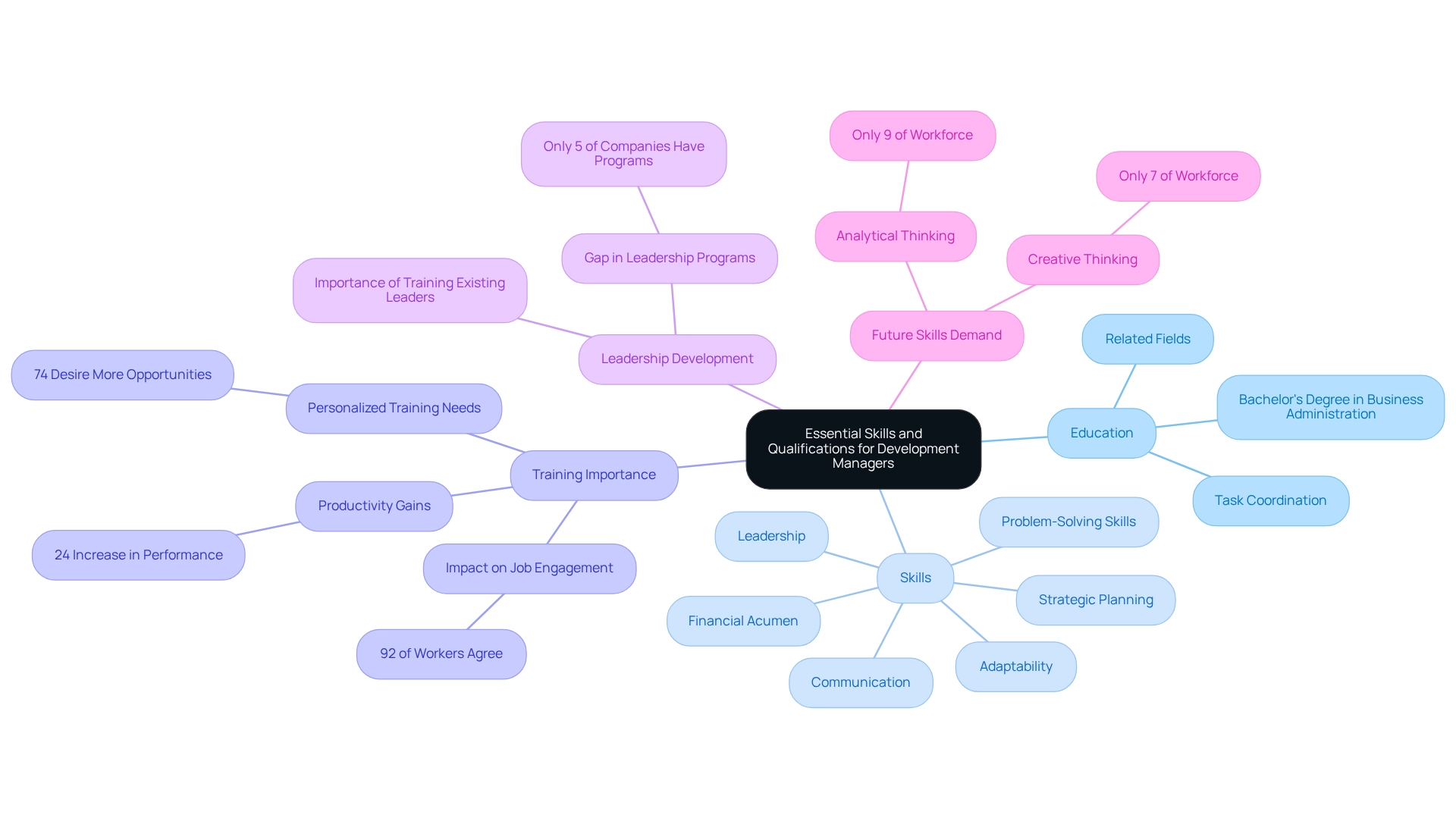
Top Development Manager Job Openings
- Development Manager Jobs at Naismiths – London: This role presents a unique opportunity to engage with a leading construction consultancy renowned for its director-led instruction and unwavering commitment to client interests. To learn more about how Naismiths can support your growth initiatives, contact us today.
How to Apply for Development Manager Positions
To successfully apply for development manager positions, candidates must strategically tailor their resumes and cover letters to emphasise relevant experience and skills. Utilising keywords from the job description is crucial, as this practice aids in navigating applicant tracking systems effectively. Statistics reveal that the average resume in 2024 lists 15 skills, an increase from previous years, underscoring the importance of showcasing a diverse skill set that appeals to employers.
Significantly, 82% of resumes lack additional work, indicating a missed opportunity for candidates to distinguish themselves.
Furthermore, networking is an essential element in the job acquisition process. Engaging with industry professionals on platforms like LinkedIn and participating in relevant events can greatly enhance visibility and opportunities. Employers value candidates who have been involved in career-related organisations, internships, or volunteer work, as these experiences demonstrate commitment and initiative.
In 2024, 55% of executive-level resumes were two pages long, suggesting that candidates should not hesitate to elaborate on their qualifications and experiences.
Moreover, preparing for interviews is vital. Candidates should practise common interview questions and demonstrate a solid understanding of the company and its projects. This preparation not only showcases their enthusiasm but also sets them apart from the competition.
As noted by career coaches, customising resumes specifically for development manager roles can significantly enhance the likelihood of securing an interview, making it essential for candidates to invest time in this process.
Leveraging Networking for Development Manager Opportunities
Networking serves as a vital resource for job seekers pursuing development manager roles within the growth administration sector. To optimise their opportunities, candidates must proactively engage with industry professionals via platforms such as LinkedIn, attend pivotal industry conferences, and participate in local networking events. Joining professional groups focused on project coordination or growth can significantly expand one’s network, fostering essential connections.
However, many professionals face challenges in maintaining their networks due to time constraints and the lingering effects of the COVID-19 pandemic on face-to-face interactions. A considerable number express a desire to network more frequently yet struggle to do so, underscoring the necessity for effective strategies to navigate these obstacles.
Effective networking transcends the mere pursuit of job leads; it demands an authentic approach centred on relationship-building. Engaging in meaningful conversations, offering assistance, or sharing insights can cultivate goodwill, often leading to unforeseen job opportunities.
Indeed, a recent survey indicated that 76% of participants believe online networking offers greater flexibility regarding location and timing, establishing it as a crucial strategy in today’s job market. Furthermore, statistics reveal that 43% of millennials find it challenging to sustain professional connections, highlighting the need for targeted networking strategies. Development leaders can greatly benefit from leveraging professional organisations, which not only enhance visibility but also grant access to exclusive development manager positions. As industry experts emphasise, the importance of networking cannot be overstated; it is a fundamental component for success in securing development manager roles within the competitive realm of project oversight.
By adopting a customer-focused approach that prioritises risk management and collaboration, project leaders can forge relationships that emphasise mutual benefits and high-quality outcomes. Numerous real-world examples illustrate how strategic networking has led to job offers and career advancements, reinforcing the notion that cultivating a robust professional network is essential for aspiring development leaders aiming to secure development manager positions.
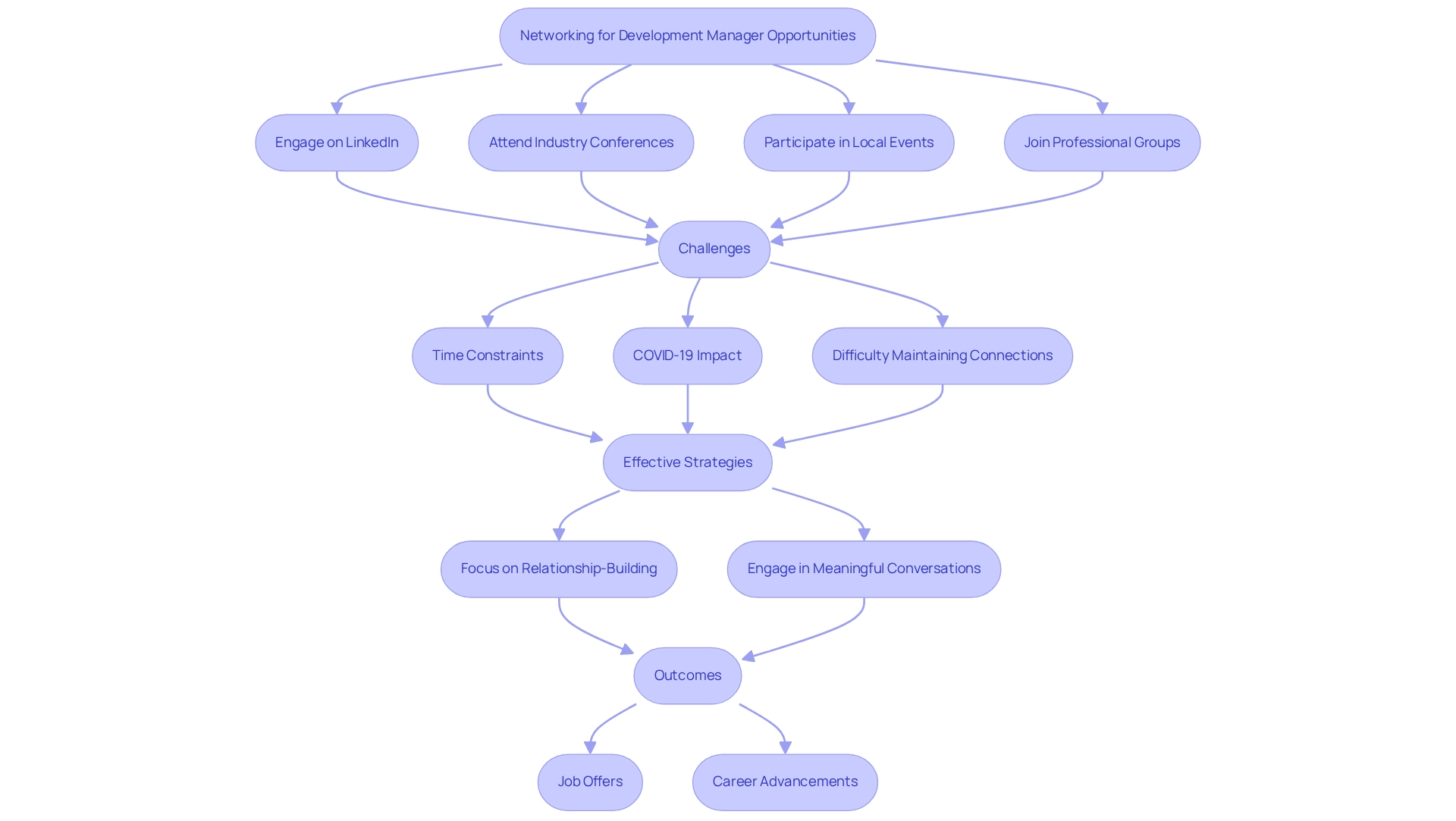
Career Advancement Opportunities for Development Managers
Development manager jobs present a wealth of career advancement opportunities. With the right experience and skills, professionals can ascend to senior leadership positions, including roles such as Director of Development or Chief Operating Officer. Many individuals in this field choose to specialise further in areas like project finance or strategic planning, significantly enhancing their career trajectory towards development manager roles. Pursuing certifications such as Project Management Professional (PMP) or Agile Certified Practitioner (PMI-ACP) is a strategic move that bolsters credibility and facilitates access to higher-level positions, including development manager roles.
Statistics reveal that 13% of companies actively recruit consulting experts, underscoring the demand for skilled professionals in leadership positions.
Ongoing education and staying abreast of industry trends are essential for securing development manager roles and achieving long-term career advancement. In-house training programmes are prevalent in the UK, with 74% of organisations offering such initiatives. This highlights the importance of professional development in advancing one’s career, particularly in the construction consultancy sector, where Naismiths actively supports employee growth through tailored training programmes, illustrating the potential for development manager roles to lead to senior positions.
Organisations that prioritise equality, diversity, and inclusion (ED&I) have demonstrated the capacity to achieve higher revenues and enhanced market positioning, indicating that a varied leadership team can yield better business outcomes. This trend emphasises the value of fostering an inclusive workplace, which significantly impacts employee engagement and retention. A case study indicates that organisations lacking efficient D&I strategies often face challenges in employee satisfaction, further highlighting the importance of these initiatives.
Expert perspectives suggest that a customer-focused approach, emphasising risk mitigation and teamwork, is crucial for achieving high-quality results.
Successful project leaders frequently underscore the significance of these strategies in their professional advancement, reinforcing the idea that effective leadership relies on strong interpersonal skills and a commitment to excellence.
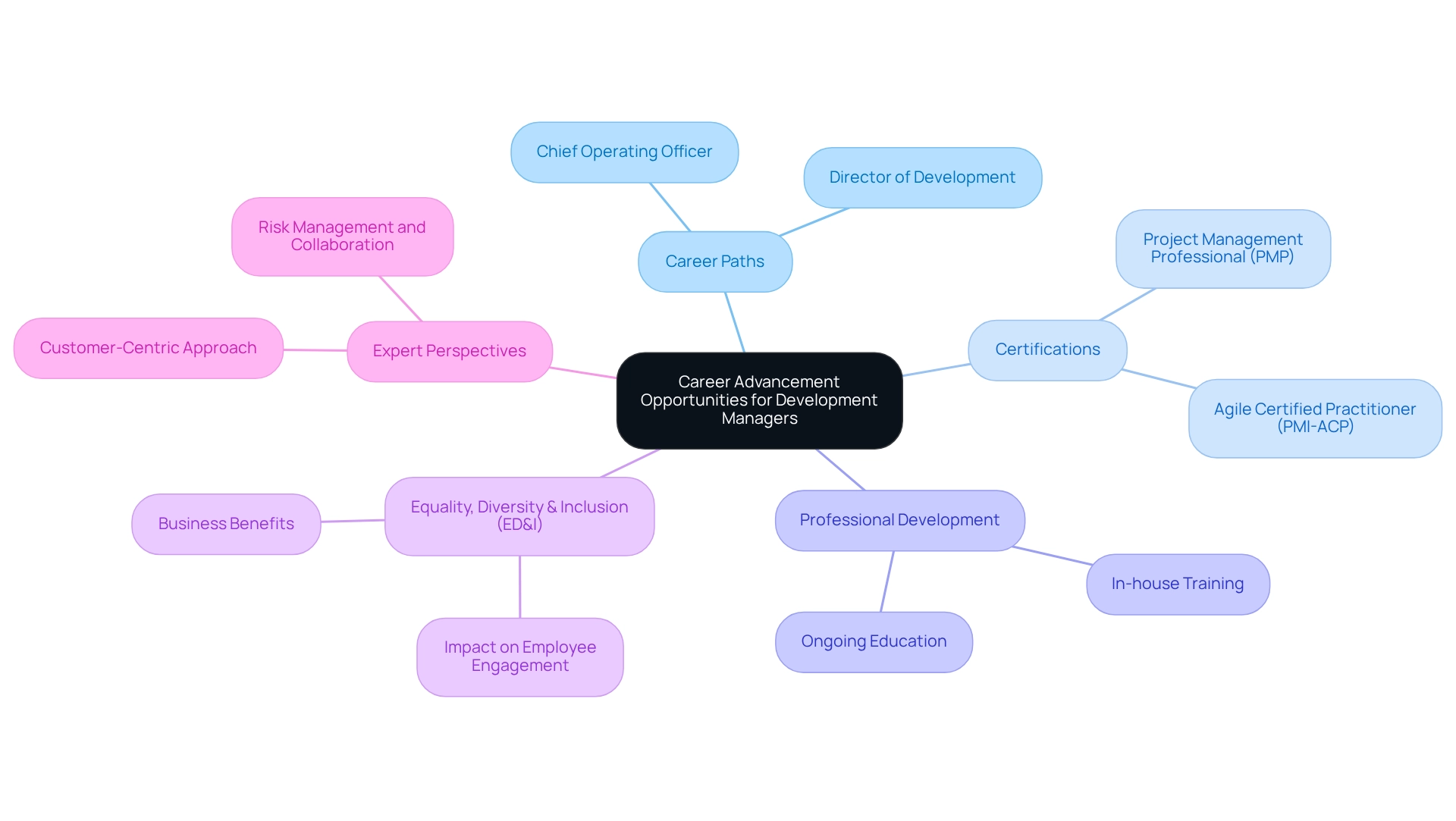
Challenges Faced by Development Managers
Development manager jobs in 2025 encounter a myriad of challenges that can significantly impact outcomes.
A staggering 38% of organisations plan to increase their Office of Project Oversight (PMO) investments this year, underscoring the growing acknowledgment of the necessity for robust oversight and strategies to effectively tackle these challenges.
Unforeseen changes often complicate these challenges, necessitating agile responses and effective communication among team members. The pressure to deliver high-quality results while ensuring profitability can be daunting in development manager roles, making strong problem-solving skills, technical expertise, and resilience essential traits for success in this position.
Expert opinions highlight the importance of clear objectives and effective planning in securing development manager roles. By focusing on communication and teamwork, managers can significantly reduce the likelihood of failures, which are often tied to inadequate planning and unclear objectives.
For instance, case studies reveal that initiatives with well-defined goals and transparent communication, such as the hotel construction, are more likely to meet their deadlines and stakeholder expectations.
Naismiths employs advanced monitoring methodologies that encompass regular progress evaluations and stakeholder engagement strategies, ensuring that all facets of the initiative align with financial goals and timelines. Practical examples illustrate how project leaders have effectively navigated these challenges. By implementing structured communication strategies and fostering a collaborative environment, they have aligned team efforts with objectives, ultimately enhancing performance.
As the landscape of initiative oversight continues to evolve, the ability to adapt and address these challenges will be crucial for leaders aspiring to excel in their roles.
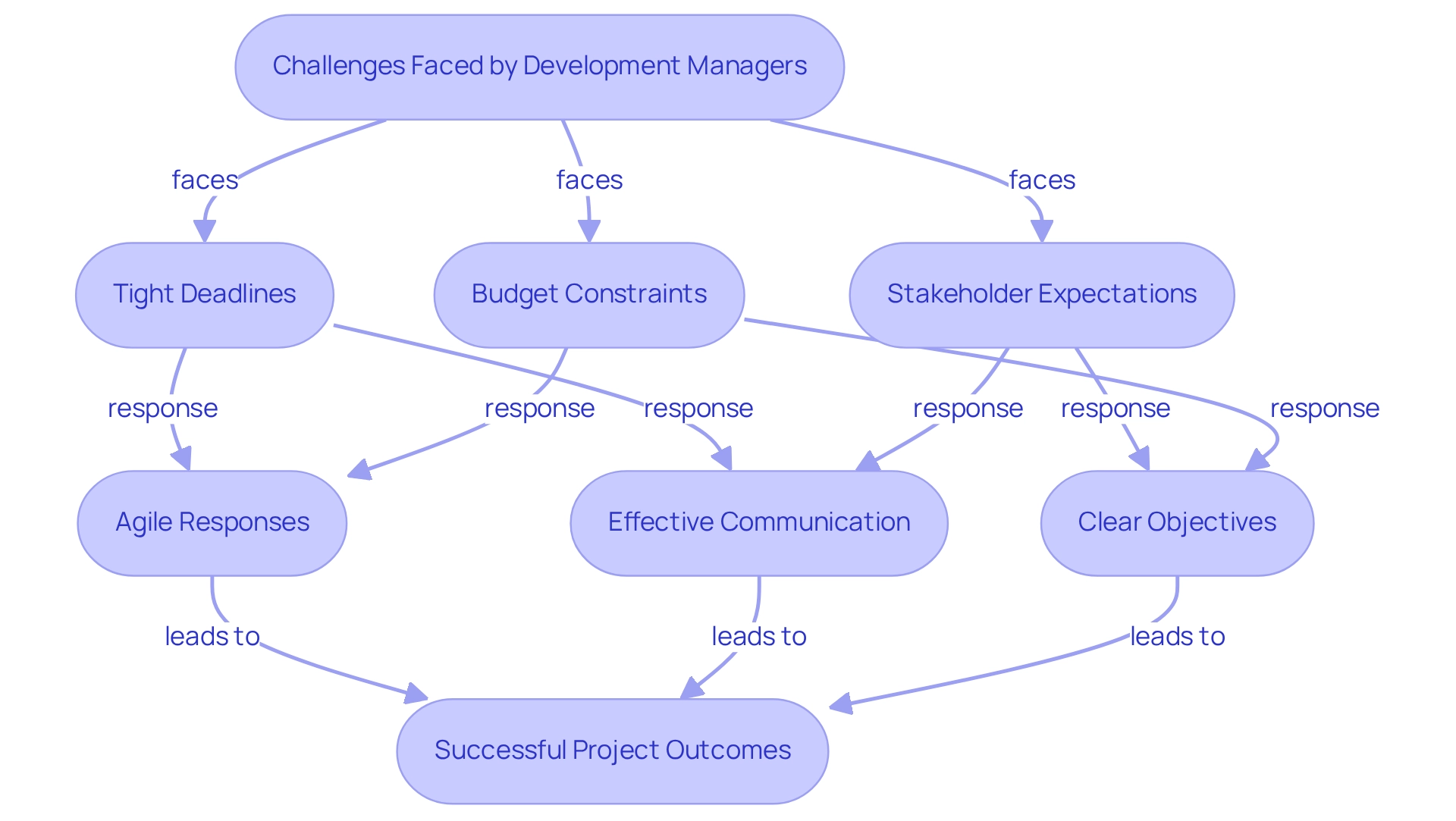
Staying Current: Industry Trends for Development Managers
To sustain a competitive advantage, supervisors in the field must remain vigilant to evolving industry trends, particularly the growing integration of technology in task coordination. In 2025, automation is expected to be transformative, with 67% of businesses already utilising process automation solutions to enhance visibility and efficiency across their operations. This shift not only streamlines workflows but also facilitates more accurate forecasting and resource allocation, which are critical for leaders managing complex tasks.
‘Naismiths’ comprehensive property enhancement platform serves as a prime example of this technological integration, providing features such as precise cost information, performance evaluation, and robust risk management tools. The platform’s user-friendly interface allows users to input and monitor key data, while its secure, cloud-based SQL database supports clear, standardised reporting and analysis. By employing APIs to gather information from external sources, development managers can benchmark costs accurately and track performance in real-time.
Moreover, the platform boasts interactive dashboards and customised reports that deliver tailored insights, significantly enhancing decision-making capabilities. The integrated technical library offers initial guidance and highlights the cost implications of essential design elements, further aiding supervisors in their planning efforts.
Sustainability practices are increasingly becoming central to managing initiatives, as stakeholders demand environmentally responsible approaches. Development manager roles that prioritise sustainable practices can attract top talent and foster a culture of inclusion and diversity, which is vital for driving innovation and improving decision-making. As noted in a recent case study, incorporating diversity, equity, and inclusion (DEI) into core strategies enhances organisational adaptability and strengthens the capacity to attract top talent.
Furthermore, staying informed about regulatory changes is crucial, as these can significantly impact funding and development timelines. Economic fluctuations also play a pivotal role; grasping these dynamics can provide managers with a strategic edge in securing funding and overcoming challenges.
This underscores the importance of teamwork in effectively managing risks associated with project oversight.
Engaging in continuous professional development through workshops, webinars, and industry publications is essential for enhancing expertise and adapting to these trends. By investing in their growth, project leaders can ensure they are well-equipped to lead initiatives that meet the demands of a rapidly evolving market.
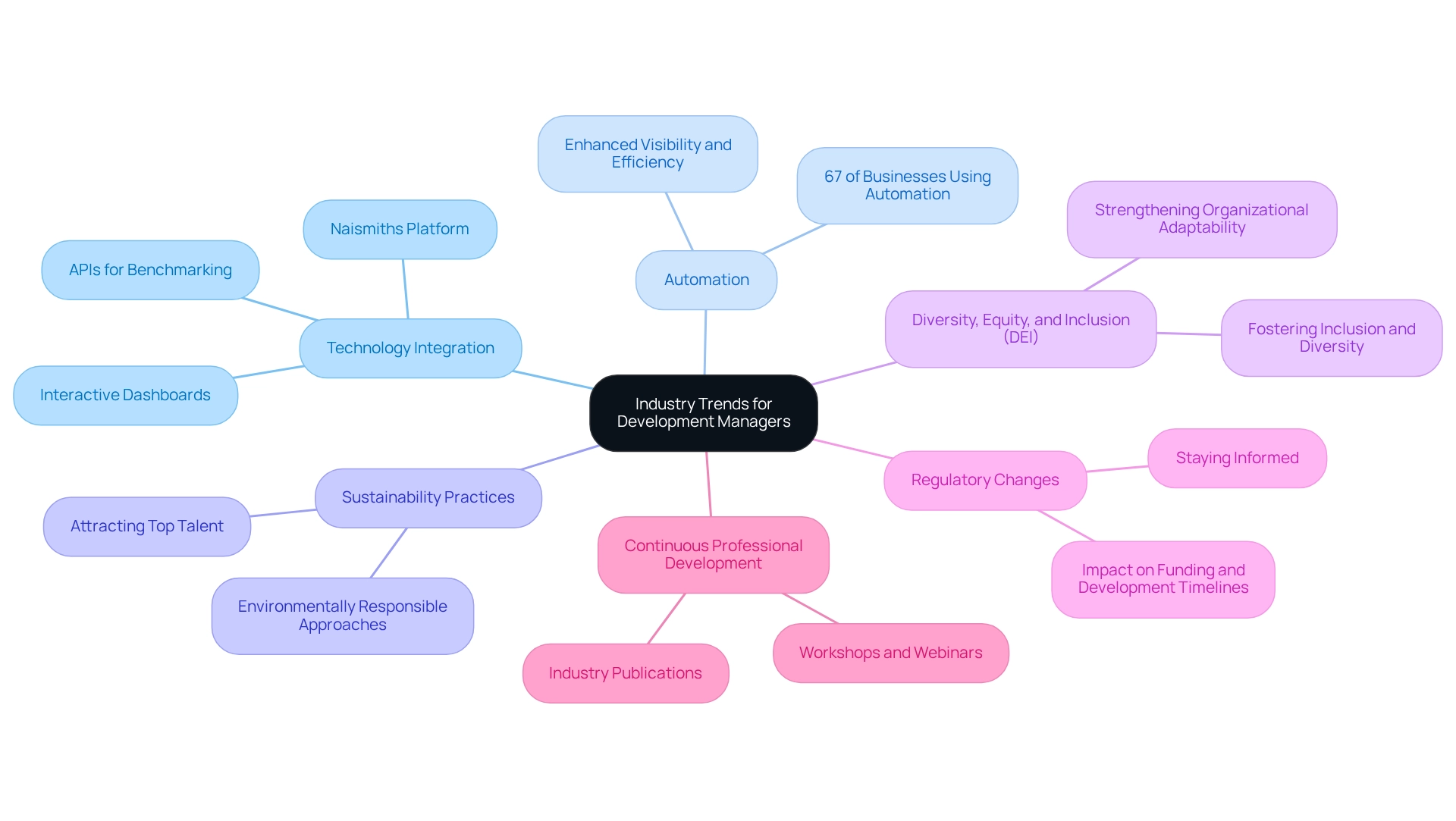
Take Action: Apply for Your Ideal Development Manager Job Today
Understanding the Development Manager’s role is just the beginning; now is the time for decisive action. Begin by meticulously reviewing your resume and tailoring your applications to highlight your relevant experience and skills. Research the sectors that are currently hiring, as this knowledge will enable you to align your application with industry expectations.
Here are essential steps to follow:
- Tailor your applications to customise each one to reflect the specific requirements of the development manager roles you are targeting. Highlight your achievements and relevant experience that directly relate to the job description. Emphasising a customer-centric approach and risk management skills can distinguish you from other candidates, as these qualities are highly valued in the industry.
- Leverage Your Network: Utilise your professional connections to gain insights into potential job openings and secure referrals. Networking can significantly enhance your chances of landing an interview, as many positions are filled through personal recommendations.
- Prepare for Interviews: Thorough preparation is essential. Research the company, understand its projects, and be ready to discuss how your background aligns with their goals. Practising common interview questions can also boost your confidence. Notably, companies that prioritise employee growth are statistically more likely to innovate and achieve higher productivity, making them appealing employers.
Stay Informed: Monitor the job market closely. Recent trends indicate that high-quality candidates are securing new positions in as little as ten days, underscoring the competitive nature of available roles. This urgency highlights the importance of taking action swiftly and effectively.
Statistics reveal that 84% of companies recognise the value of a learning culture, which can be a significant asset in your job search. Furthermore, 40% of organisations prioritise mental health initiatives, reflecting a growing awareness of the impact of workplace culture on employee satisfaction and productivity. Organisations with a strong learning culture are 92% more likely to create new products, 52% more efficient, and 17% more profitable than their rivals, demonstrating the advantages of investing in employee training.
As you embark on your job search, remember that the typical applicant for a developmental role submits numerous applications. Tailoring each one can set you apart in a crowded field. By following these steps and leveraging your network effectively, you can enhance your chances of securing development manager positions and advancing your career in property and housing.
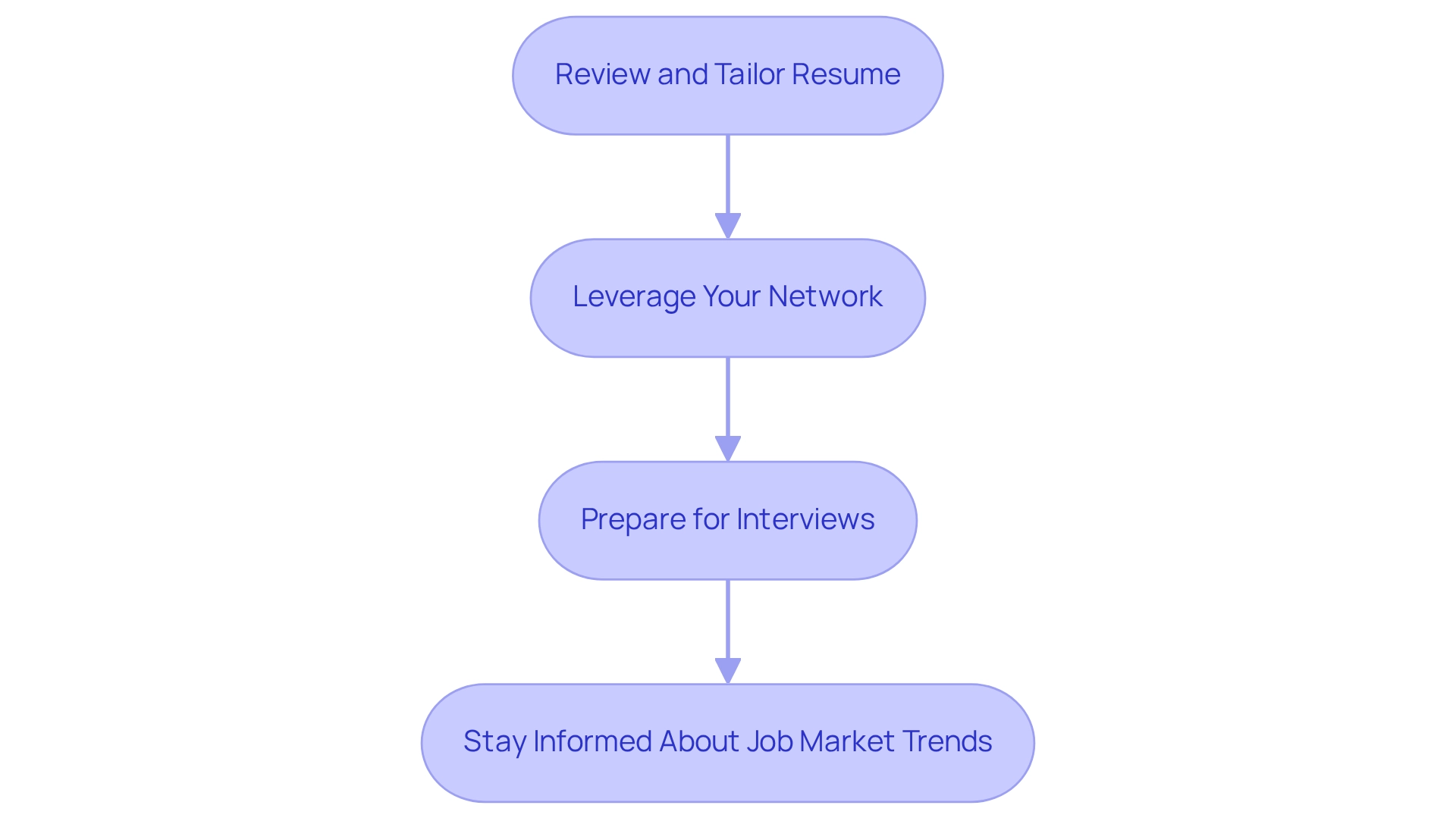
Conclusion
The role of a development manager is increasingly vital in today’s dynamic project management landscape, encompassing responsibilities such as:
- Coordinating teams
- Managing budgets
- Ensuring quality standards
As demand for skilled professionals surges across sectors like construction, technology, and healthcare, development managers must cultivate essential skills and qualifications, including:
- Leadership
- Strategic planning
- Adaptability
Furthermore, the integration of technology, particularly automation, is reshaping project management practices, underscoring the necessity for continuous learning and the ability to stay current with industry trends.
Moreover, networking emerges as a crucial strategy for aspiring development managers, enabling them to connect with industry professionals and discover job opportunities. By fostering relationships and engaging in meaningful conversations, candidates can enhance their visibility and significantly increase their chances of securing desirable positions. The emphasis on a customer-centric approach and collaboration is paramount in navigating the complexities of modern projects and achieving successful outcomes.
In conclusion, the journey to becoming a successful development manager requires a proactive approach, from honing relevant skills and qualifications to leveraging networking opportunities. By taking decisive action and staying informed about industry trends, aspiring professionals can effectively position themselves for success in a competitive job market. Embracing these strategies not only enhances individual career prospects but also contributes to the overall success of organisations navigating the challenges of project execution. Now is the time to invest in personal growth and take the necessary steps toward a rewarding career in development management.